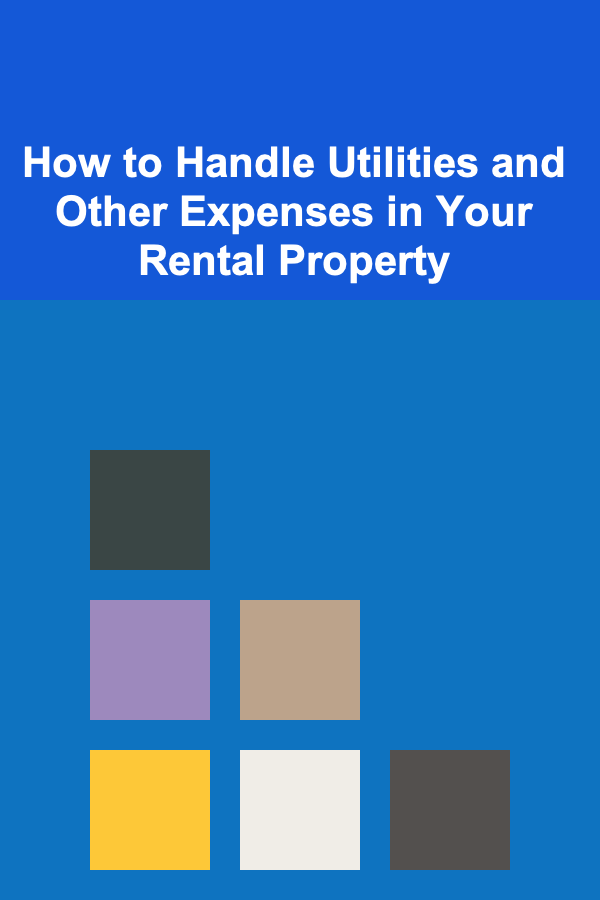
How to Handle Utilities and Other Expenses in Your Rental Property
ebook include PDF & Audio bundle (Micro Guide)
$12.99$7.99
Limited Time Offer! Order within the next:

Owning a rental property comes with a variety of responsibilities and challenges. One of the most significant aspects of managing a rental property is determining how to handle utilities and other ongoing expenses. Properly managing these costs can have a substantial impact on the profitability of your investment, as well as tenant satisfaction.
In this article, we will delve into how to manage utilities and other expenses in your rental property, including which expenses are typically covered by the landlord, which are covered by the tenant, and how to structure your lease agreements. We will also explore strategies for minimizing costs and ensuring that both parties are satisfied with the arrangement.
Understanding Utilities and Expenses in a Rental Property
Before diving into the details of how to handle utilities and expenses, it's essential to understand the different types of utilities and expenses typically associated with rental properties. These costs can vary depending on the type of property, its location, and the specific agreements you have with your tenants.
Types of Utilities and Expenses
- Water and Sewer: This includes the water supply for the property, as well as any sewage or wastewater treatment costs.
- Electricity: The energy used to power lights, appliances, and heating or cooling systems.
- Gas: If the property has a gas line, it will be used for heating, cooking, and possibly hot water.
- Trash Removal: The cost of waste disposal services.
- Internet and Cable: Internet services and cable television may or may not be included, depending on your agreement.
- Maintenance and Repairs: Routine maintenance such as lawn care, pest control, and HVAC servicing.
- Property Taxes: Depending on your jurisdiction, property taxes may be a significant ongoing cost.
- Insurance: Landlord insurance is essential to protect the property and liability.
Understanding these utilities and expenses is crucial to properly managing the costs and setting clear expectations with your tenants.
Who Pays for What?
The allocation of utility costs and other expenses between the landlord and tenant is a matter that should be clearly addressed in the lease agreement. There are different ways to handle these expenses, and the decision often depends on the rental market, the type of property, and regional regulations.
A. Utilities Covered by the Landlord
Some landlords opt to cover certain utilities as part of the rental price. This is more common in markets where it's competitive to attract tenants, or for certain types of rental properties (e.g., multi-family units, apartments). Covering utilities can make the rental more appealing, but it also requires careful financial planning.
Common utilities covered by the landlord might include:
- Water and Sewer: Landlords may pay for water and sewer, particularly in multi-unit properties, where metering individual water usage could be difficult or impractical.
- Trash Removal: In some cases, landlords will include trash removal as part of the rent, ensuring that the property is well-maintained.
- Gas and Electricity: Although less common, some landlords may opt to include gas or electricity in the rent, particularly for properties with shared systems.
While offering utilities can make the rental more attractive to tenants, it's important to account for these costs when setting rent prices. If utilities are included, it's essential to regularly monitor usage and ensure that the costs remain manageable.
B. Utilities Covered by the Tenant
In most cases, utilities such as electricity, gas, water, and internet are paid directly by the tenant. The tenant typically establishes utility accounts in their name, and the landlord is not responsible for paying these bills. However, the landlord may still need to manage the setup and ensure that utility services are connected and functional at the start of the lease.
Typical utilities paid by tenants include:
- Electricity: Tenants typically pay for their electricity usage, which includes lighting, heating, cooling, and running appliances.
- Gas: In homes or apartments with gas heating or cooking, tenants usually pay for this utility.
- Internet and Cable: Tenants often pay for internet access, phone service, and cable television, although some landlords may provide internet as an amenity.
- Water and Sewer: Depending on the market and the property, tenants may pay their own water and sewer bills.
This structure is more straightforward, as tenants are directly responsible for their own usage. It also helps landlords avoid financial risks associated with high utility bills, especially in larger properties or in multi-unit buildings where each unit's usage could vary.
C. Shared Utility Costs
In some situations, landlords and tenants may agree to share the cost of certain utilities. This can be accomplished in a few different ways, depending on the layout of the property and the needs of the parties involved.
- Flat Rate: In this model, the landlord and tenant agree to a fixed monthly amount for utilities that is added to the rent. The tenant pays the same amount each month regardless of their usage. This can help simplify billing but may lead to either the landlord or tenant feeling the burden if usage is unusually high or low.
- Pro-Rated or Percentage-Based: In some cases, utility costs are split based on square footage or the number of tenants. This approach is often used in multi-family units or in situations where the landlord is paying for utilities but wants to ensure fairness in distribution.
Regardless of the approach, it's important to clarify how utility costs will be split and ensure that the terms are clearly outlined in the lease.
How to Structure Your Lease Agreement
Your lease agreement plays a crucial role in how utilities and expenses are handled. To prevent misunderstandings and disputes, it is essential to be clear and thorough in specifying which utilities and expenses the landlord and tenant are responsible for. Below are some essential considerations to include in the lease agreement.
A. Utility Responsibility Clause
One of the most critical sections of the lease is the utility responsibility clause. This should clearly outline which utilities are covered by the landlord and which are the responsibility of the tenant. Include the following:
- List of utilities: Clearly state which utilities are included in the rent and which are the tenant's responsibility.
- Billing Procedures: If utilities are shared or divided, explain how billing will work (e.g., flat rate, pro-rated, percentage).
- Set-Up Requirements: If the tenant is responsible for setting up utilities, clarify how and when this should be done. For instance, tenants may need to provide proof of utility account setup by a certain date.
B. Rent Adjustments Based on Utilities
In some cases, the rent may be adjusted based on the utilities included. If you are offering a flat rate for utilities, the rent should reflect the average utility costs for the property. If you are not including utilities, ensure that the rent is competitive enough to attract tenants while also covering your operating expenses.
C. Responsibility for Maintenance and Repairs
It's also essential to specify who is responsible for maintaining and repairing utilities. For example:
- HVAC Systems: Are you, as the landlord, responsible for ensuring the HVAC system is in good working order, or is this the tenant's responsibility?
- Plumbing and Electrical Repairs: Who will cover the cost of plumbing or electrical issues that arise during the tenancy?
- Major Appliances: If you are providing appliances (such as a refrigerator or washer), ensure that the responsibility for repairs is clearly laid out in the lease.
D. Late Fees for Unpaid Utility Bills
If utilities are included in the rent but paid by the landlord, it is essential to include a clause addressing what will happen if the tenant does not pay their rent on time. Late fees for unpaid utility bills may need to be clarified, especially if utilities are billed separately.
Strategies for Minimizing Utility Costs
Managing utility expenses can be a significant part of maintaining the profitability of your rental property. While many utilities are outside your control, there are several strategies landlords can use to minimize utility costs without sacrificing tenant comfort.
A. Energy Efficiency Upgrades
Investing in energy-efficient upgrades can significantly reduce utility costs over the long term. Here are a few improvements that can help:
- Energy-Efficient Appliances: Replacing old appliances with energy-efficient models (such as Energy Star-rated refrigerators, washing machines, and dishwashers) can lower energy consumption.
- LED Lighting: Swapping out incandescent or fluorescent bulbs for energy-efficient LED lights can reduce electricity usage.
- Insulation and Weatherproofing: Proper insulation and weatherproofing can reduce heating and cooling costs. This can include sealing windows and doors, insulating attics, and upgrading the HVAC system.
B. Smart Technology
Implementing smart home technology, such as smart thermostats, lighting, and appliances, can help tenants monitor and control their energy use more efficiently. For example, smart thermostats can adjust the temperature automatically based on occupancy patterns, saving energy and reducing heating and cooling costs.
C. Water Conservation
Water conservation strategies can also help reduce utility bills. Installing low-flow fixtures, such as toilets, showerheads, and faucets, can reduce water consumption. Additionally, promoting water conservation practices to tenants can also reduce costs.
D. Regular Maintenance
Regular maintenance of heating, cooling, plumbing, and electrical systems is essential for ensuring efficiency. A well-maintained HVAC system or water heater will run more efficiently, reducing overall energy usage.
Conclusion
Handling utilities and other expenses in your rental property requires careful consideration and clear communication between landlords and tenants. By setting clear expectations in the lease agreement, minimizing costs through energy-efficient upgrades, and maintaining transparency regarding utility responsibilities, you can ensure a smooth and profitable rental experience for both you and your tenants.
Whether you decide to cover certain utilities, let tenants pay for them, or split the costs in a fair manner, it's crucial to understand the financial implications of each approach. By staying organized and proactive, you can avoid surprises, minimize expenses, and keep your rental property running smoothly.

How to Create an Efficient System for Grocery Shopping
Read More
How to Design a Walk-In Closet with Maximum Storage Capacity
Read More
How to Evaluate Remote Job Offers: Beyond Salary
Read More
How to Plan a Family Scavenger Hunt Indoors
Read More
How to Start a Daycare from Home and Make Extra Income
Read More
Why Creating a Homework Station Boosts Kids' Productivity
Read MoreOther Products

How to Create an Efficient System for Grocery Shopping
Read More
How to Design a Walk-In Closet with Maximum Storage Capacity
Read More
How to Evaluate Remote Job Offers: Beyond Salary
Read More
How to Plan a Family Scavenger Hunt Indoors
Read More
How to Start a Daycare from Home and Make Extra Income
Read More